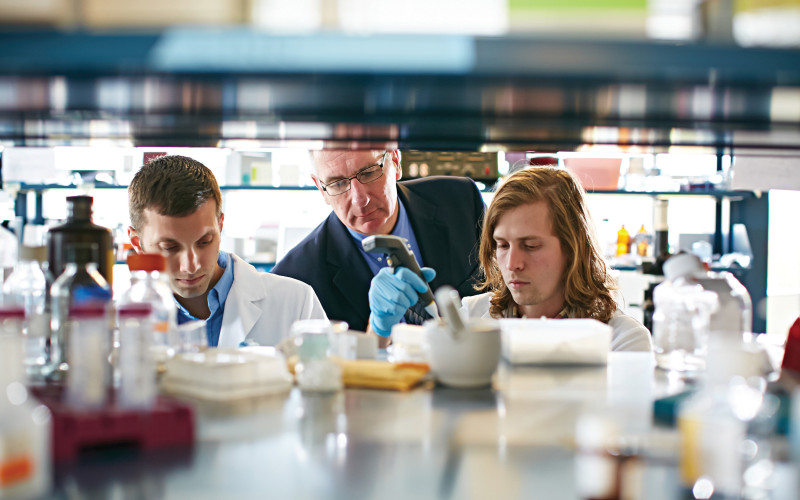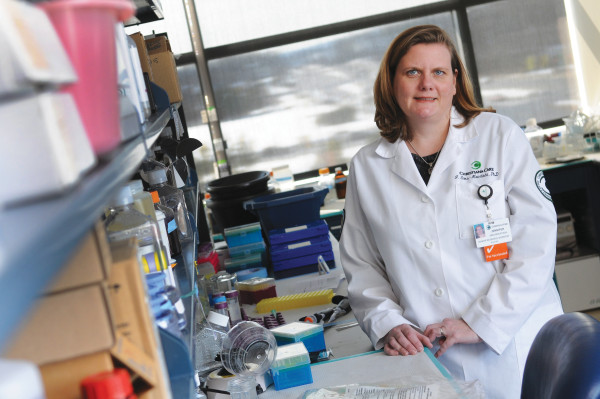Researchers tailor human genome for more personalized cancer treatments

The Center for Translational Cancer Research (CTCR) at Christiana Care’s Helen F. Graham Cancer Center & Research Institute is among fewer than 35 companies and institutions in the world producing “designer” proteins capable of tailoring genetic material to develop personalized treatments for cancer and other genetic diseases.
“Technology like TALENs will skyrocket translational cancer research.”
Transcription activator-like effector nucleases — TALENs — are synthetically engineered to precisely break DNA sequences at targeted sites along the human genome. Scientists can use TALENs to change the genetic code by cutting out a gene or ferrying in a new one and then stimulating the cell’s own repair mechanisms to complete the job.
“The potential of this technology lies in its capacity to precisely recapitulate the genetic profile of a tumor, extracted from the patient, in cells that can be used in the laboratory for screening the effectiveness of anti-cancer drugs,” said Chemistry Department Chair Eric Kmiec, Ph.D., at Delaware State University in Dover. Dr. Kmiec is also director of the Genome Customization Core, a research group at the CTCR.
The Core custom designs TALENs for researchers around the country, including a number from the Wistar Institute of Philadelphia, a research partner with the Graham Cancer Center. The Core also is working with the University of Delaware, Delaware State University and area biotech companies.

“This technology is on the cutting edge of translational science,” said Nicholas J. Petrelli, M.D., Bank of America endowed medical director of the Graham Cancer Center. “Dr. Kmiec and I see this as only the beginning of the types of partnerships that can be accomplished in the CTCR. Bringing together scientists and clinicians under one roof continues to be successful, and technology like TALENs will skyrocket translational cancer research.”
TALENs technology also has dramatically reduced the time required to recreate genetic sequences in the lab, from 18 months to about six weeks.
“This approach is an important step forward in developing a personalized treatment regimen for an individual so that we can provide the primary physician with information about which drugs might work best against a specific cancer,” Dr. Kmiec said. The challenge, he added, is to identify the specific DNA changes that account for a particular tumor’s genetic makeup, and that is what cancer researchers continue to work on.

For example, CTCR Senior Clinical Scientist Jennifer Sims-Mourtada, Ph.D., is using TALENs technology to study biological pathways associated with the loss of the BRCA1 gene known to increase the risk for hereditary breast cancer.
“Working with normal tissue samples we have banked at our Tissue Procurement Center, I can use TALENs to model what might happen in a normal, healthy patient when the BRCA1 gene is turned off and then study the pathways affected,” she said. “Understanding these mechanisms potentially will lead us to more individualized treatments and less invasive preventive alternatives to mastectomies for this very aggressive breast cancer.”
“We are on the threshold of being able to identify the genetic changes that lead to cancers and other diseases that are unique to a specific minority or ethnic group, and the Graham Center’s Tissue Procurement Center is a valuable resource in this process,” Dr. Kmiec said. TALENs can be helpful to researchers of genetic diseases, such as sickle cell anemia, which affects one out of every 625 African-Americans.
“In the big picture, it’s especially significant for DSU, a historically black college and university, to partner with the Graham Cancer Center, which has worked so hard and already has been so successful in reducing disparities for African-Americans,” he said. “We want to go further and faster.”
The TALENs Core, the first jointly shared core in Delaware, receives a portion of its funding from an IDeA Networks of Biomedical Research Excellence (INBRE) grant to improve the caliber of research. The Graham Center and DSU share the grant with the University of Delaware, Nemours/Alfred I. duPont Hospital for Children and Wesley College